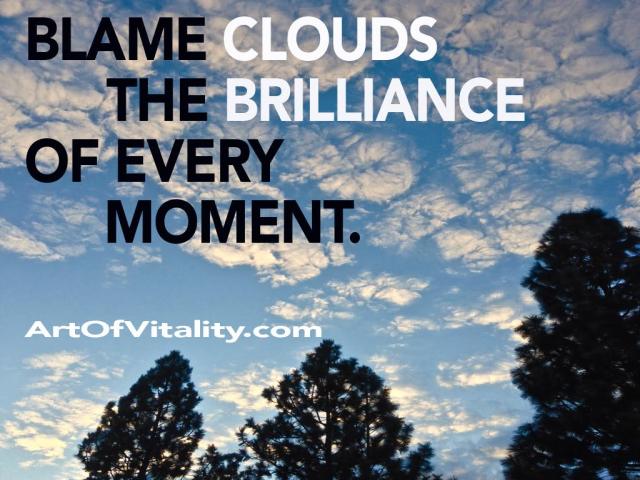~
*Dear elephant reader: if you’re single & looking for mindful dating or conscious love, try out our lovely partner, MeetMindful.
~
I spent a few days last week with my dad.
During my visit, a desire welled up to forgive him for all of the times I have judged him harshly.
I was enjoying my visit, loving our time together and appreciating him for who he is right now. I can feel his love for me. He is open and appreciative. He sparkles.
I failed. I had a really hard time empowering myself to forgive. I was too attached or, more accurately, addicted to the blame.
On my five hour drive home and in the days that followed, I came to two major conclusions.
The first conclusion was easy: I use blame as a vent for the feelings of overwhelm, stress and fear.
I use blame as a way to moderate my vitality, to maintain a familiar range of emotion, intimacy, creativity and vigor. Blame drains me. It keeps me small, limits my growth and neutralizes any momentum I muster.
Blame is a habit—it is about wanting to regain my comfort zone. I use blame the same way I use ice cream and blueberry muffins. They give me a quick jolt and then bring all of my systems down a few notches as my body tries to regain its balance.
The high and crash cycle. I get all worked up, mentally masturbate and then emo-gasm until I am spent…and left feeling comfortably underwhelmed.
My second realization hit me like a brick: I use him (the blaming of him) as a scapegoat because I don’t like myself.
I started by taking a look at what I thought I was blaming him for. It was nonsense—the railings of a child not getting his way. None of it had any current value. Most of it was vague recollections and held resentments. It was all past-tense drama that I was choosing to hold on to.
I was using him like a dirty mirror.
I realized I was choosing to project all of the things I don’t like about myself onto him. I created stories, regurgitated the past, projected, damned and condemned.
I fueled the blame until it burned brighter than my desire to forgive.
Underlying it all is a strong irrational desire to change the past so that my present can be different. So that I could be different.
Not gonna happen. What happened, happened. Sh*t can’t unhappen.
When I was a kid, I blamed him because he wasn’t around. I felt lonely and wasn’t emotionally mature enough to value aloneness. I felt unsure and afraid and was not sufficiently mentally developed to own that all growth comes from discomfort and every fear is a projection.
I can’t use those excuses now. I know better.
So here is what I know and my path to change:
For me, the answer to end my addiction to blame and stop struggling to forgive isn’t finding a better way to forgive, being kinder, more empathetic, compassionate or more “spiritual.”
The answer is to remove the blame. To unblame. To accept.
Acceptance isn’t anything other than acknowledging the actuality of my past. It doesn’t imply any sort of justification, surrender, or forgiveness.
I intend to retire my need for the past to be different.
I will accept myself for how I was and how I am. I will stop when I hear that blame voice in my head and let another voice emphatically say, “It is not about them; what are you not liking about yourself now and why are you trying to deflate yourself?”
I will view the dredging-up-the-past, blame-someone-and-vent cycle as a sign that I am energized. I will let the blame cycle be a sign of success—a signal that I have more energy than is currently required; and that I have the capacity, right then, to move powerfully forward.
I will ask myself if there is a better place I could use the energy I am about to expend blaming. And then I will ask these questions:
What do you love?
Who do you love?
What goals and intentions do you have?
Is there an action you could take, right now, that would allow you to love, be or do more?
There always is and I am practicing this mantra:
“Don’t think. Dive in. Immerse yourself in action.”
Relephant:
Letting Go: How I Started a Forgiveness Practice to Freedom.
Author: Jeff Sanders
Assistant Editor: Hilda Carroll/Editor: Catherine Monkman
Photo: Courtesy of author











Read 1 comment and reply